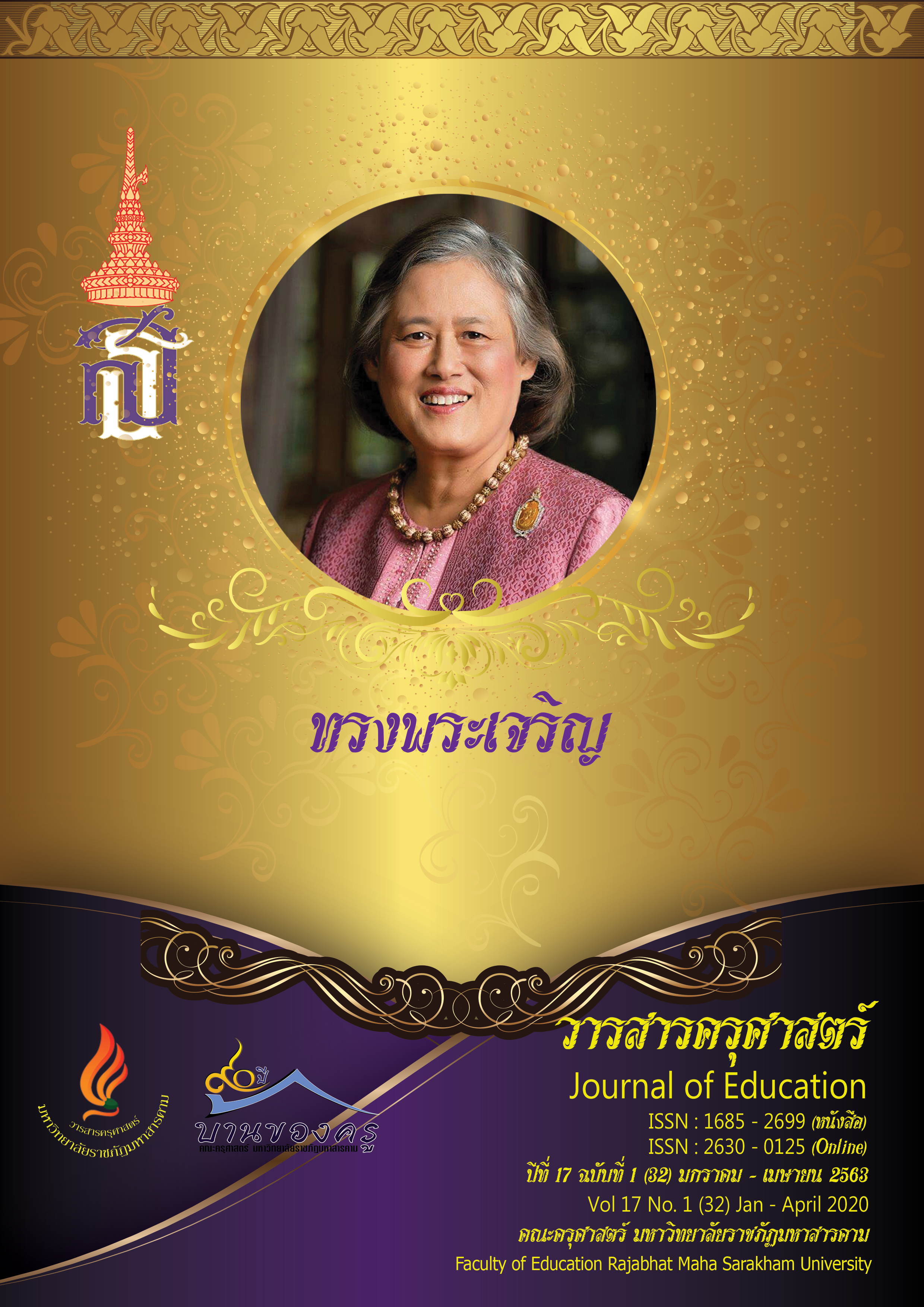Development of Mathematics Learning Achievement on Preliminary Data Analysis For 11th Graders by Using CIPPA Learning Model.
Main Article Content
Abstract
The purposes of this study were: 1) to development of Mathematics learning achievement
on preliminary data analysis for 11th graders by Using CIPPA Learning Model with the effectiveness
of 70/70 standardized criteria, 2) to study the effectiveness index by Using CIPPA Learning Model,
3) to compare the students’ learning achievement, 4) to study the retention of the students’ learning
and 5) to study students’ satisfaction toward the learning achievement. The sample groups were 36
of 11th graders room 2 at Nadoonprachasan School in the 2nd semester in academic year 2017. The
research instruments were 1) lesson plans, 2) a 4 multiple-choices test, 3) a 5 rating scale
questionnaire on students’ satisfaction. The statistics used for data analysis were percentage, mean,
standard deviation, and t-test (Dependent Samples).
The results revealed were: 1) Development of Mathematics learning achievement on
preliminary data analysis for 11th graders by using CIPPA learning model was 80.95/78.15
(E1/E2) which higher than 70/70 criteria established, 2) an effectiveness index of learning management
was 67.27%, 3) after students’ learning achievement on the preliminary data analysis for 11th graders
by using CIPPA learning model were higher than before learning the CIPPA instruction model was at
.05 level of the statistical significance, 4) the students’ retention of the preliminary data analysis
after learning with the CIPPA learning model and after 2 weeks were not significantly different and
5) students’ satisfaction toward developing learning management by using CIPPA learning model was
at the high level.
Article Details
ข้อกำหนดเบื้องต้นที่ผู้นิพนธ์(ผู้ส่งบทความ) ควรทราบ
1. ผู้นิพนธ์ที่ประสงค์จะลงตีพิมพ์บทความกับวารสาร ตั้งแต่เดือนมกราคม 2563 เป็นต้นไป ให้ใช้รูปแบบใหม่ (Template 2563) โดยสามารถดูตัวอย่างได้ที่เมนู GUIDELINES
2. จะตีพิมพ์และเผยแพร่ได้ ต้องผ่านการประเมินจากผู้ทรงคุณวุฒิ (Peer Review)
3. การประเมินบทความโดยผู้ทรงคุณวุฒิ (Peer Review) เป็นแบบ Double Blind
4. การอ้างอิงบทความใช้หลักเกณฑ์ APA (American Psychological Association) คลิก
5. บทความถูกปฏิเสธการตีพิมพ์ ไม่ผ่านการประเมิน ผู้นิพนธ์ขอยกเลิกเองหรือชำระเงินก่อนได้รับการอนุมัติ ทางวารสารไม่มีนโยบายการคืนเงิน
References
กระทรวงศึกษาธิการ. (2548). หลักสูตรแกนกลางการศึกษาขั้นพื้นฐาน พุทธศักราช 2551. กรุงเทพมหานคร:สำนักงานทดสอบทางการศึกษา กรมวิชาการ.
ดอกแก้ว สิงห์เผ่น. (2550). ผลการเรียนรู้กลุ่มสาระการเรียนรู้คณิตศาสตร์ เรื่องทฤษฎีกราฟเบื้องตน้ ชั้นมัธยมศึกษาปีที่ 5 โดยใช้กิจกรรมการเรียนรู้แบบซิปปา (CIPPA Model) (วิทยานิพนธ์ปริญญาการศึกษามหาบัณฑิต)มหาวิทยาลัยมหาสารคาม, มหาสารคาม.
ดารารัตน์ จารพิมพ์. (2558). การเปรียบเทียบผลการจัดการเรียนรู้ด้วยชุดกิจกรรม เรื่อง การแก้โจทย์ปัญหาระคนชั้นประถมศึกษาปีที่ 3 โดยใช้การเรียนรู้แบบซิปปากับการเรียนแบบปกติ (วิทยานิพนธ์ปริญญาครุศาสตรมหาบัณฑิต). มหาวิทยาลัยราชภัฏบุรีรัมย์, บุรีรัมย์.
ทิศนา แขมมณี. (2554). ศาสตร์การสอน : องค์ความรู้เพื่อการจัดกระบวนการเรียนรู้ที่มีประสิทธิภาพ(พิมพ์ครั้งที่ 14). กรุงเทพมหานคร: สำนักพิมพ์แห่งจุฬาลงกรณ์มหาวิทยาลัย.
. (2554). รูปแบบการเรียนการสอน : ทางเลือกที่หลากหลาย. กรุงเทพมหานคร:จุฬาลงกรณ์มหาวิทยาลัย.
ทิศนา แขมมณี. (2542). การจัดการเรียนการสอนโดยยึดผู้เรียนเป็นศูนย์กลาง : โมเดลซิปปา CIPPA MODEL.วารสารครุศาสตรN, 27(3), 1–17.
บุญชม ศรีสะอาด. (2556). การวิจัยเบื้องต้น (ฉบับปรับปรุงใหม่) (พิมพ์ครั้งที่ 9). กรุงเทพมหานคร: สุวิริยาสาสน์.
ปิยะธิดา ปัญญา. (2558). การวัดและการทดสอบแบบอิงกลุ่ม. มหาสารคาม: ตักสิลาการพิมพ์.
วิมลรัตน์ สุนทรโรจน์. (2554). การออกแบบการจัดการเรียนรู้ตามแนวคิดแบบ Backward Design (พิมพ์ครั้งที่ 2).มหาสารคาม: มหาวิทยาลัยมหาสารคาม.
วรรณวิภา สินมา. (2557). การเปรียบเทียบผลสัมฤทธิ์ทางการเรียนและเจตคติต่อการเรียนคณิตศาสตร์เรื่อง การวิเคราะห์ข้อมูลเบื้องต้นของนักเรียนชั้นมัธยมศึกษาปีที่ 5 ระหว่างการจัดการเรียนรู้โดยใช้รูปแบบซิปปากับแบบแบ่งกลุ่มผลสัมฤทธิ์ (วิทยานิพนธ์ครุศาสตรมหาบัณฑิต).มหาวิทยาลัยราชภัฏเทพสตรี, ลพบุรี.
สถาบันส่งเสริมการสอนวิทยาศาสตร์และเทคโนโลยี. (2545). คู่มือการจัดการเรียนรู้กลุ่มสาระการเรียนรู้คณิตศาสตร์. กรุงเทพมหานคร: สถาบันส่งเสริมการสอนวิทยาศาสตร์และเทคโนโลยี.
อัญชนา สายสร้อย. (2550) ผลการจัดกิจกรรมการเรียนรู้เรื่องเงิน กลุ่มสาระการเรียนรู้คณิตศาสตร์ ชั้นประถมศึกษาปีที่ 2 โดยใช้รูปแบบการสอนแบบซิปปา (CIPPA Model) (วิทยานิพนธ์การศึกษามหาบัณฑิต).มหาวิทยาลัยมหาสารคาม, มหาสารคาม.
Crites, J. O. (1981). Career counseling model methods. New York: Mc Graw-Hill.
Super, D. E. (1960). The psychology of career. New York: Harper and Row publishers.


